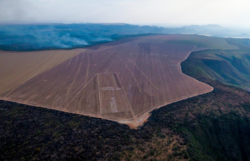InfoMoney | 8 January 2024
Cosan and Nuveen create joint venture to manage land
(Note: this is a translation of the original)
Operation creates Radar Gestão de Investimentos and will manage areas of the two companies in Latin America
Operation creates Radar Gestão de Investimentos and will manage areas of the two companies in Latin America
By Alexandre Inacio
Cosan (CSAN3) is eyeing the potential of the farmland market in Brazil and is positioning itself for future opportunities. Rubens Ometto's company is creating a joint venture with Nuveen Natural Capital, an arm of the Teachers Insurance and Annuity Association of America (TIAA).
The operation will create Radar Gestão de Investimentos, where each side will own half of the business. The new company will incorporate the areas managed by Radar, Cosan's vertical that already looks after the group's land, distributed in sugar cane, grains and eucalyptus, and also those managed by Nuveen in Latin America, concentrated in eucalyptus.
The new company will manage assets valued at more than R$18 billion. On Cosan's side, the 315,000 hectares managed today are worth R$14.6 billion. On Nuveen's side, there will be 170,000 hectares managed by the fund in Brazil, Chile, Uruguay, Colombia and Panama, valued at just over R$4 billion.
The expectation is that the deal will bring synergies to both sides. Cosan will now actively manage its portfolio and other investments that may be incorporated. For Nuveen, the JV increases the portfolio of land already under the fund's management.
Cosan and TIAA are long-standing partners. The two already work in agricultural land management, and are partners in the management of areas in Brazil. The JV is expected to accelerate its land business in the country from 2024, after two years on hold.
The rise in commodity prices during the pandemic, accentuated by the war between Ukraine and Russia, ended up holding back the land market as areas appreciated in value. Now, with the fall in commodities, the scenario has been reversed.
Many producers who expanded their production through leases are starting to find it difficult to honour commitments to the values assumed during the boom. As a result, the expectation is for an increase in the availability of areas to be leased over the next few months.












